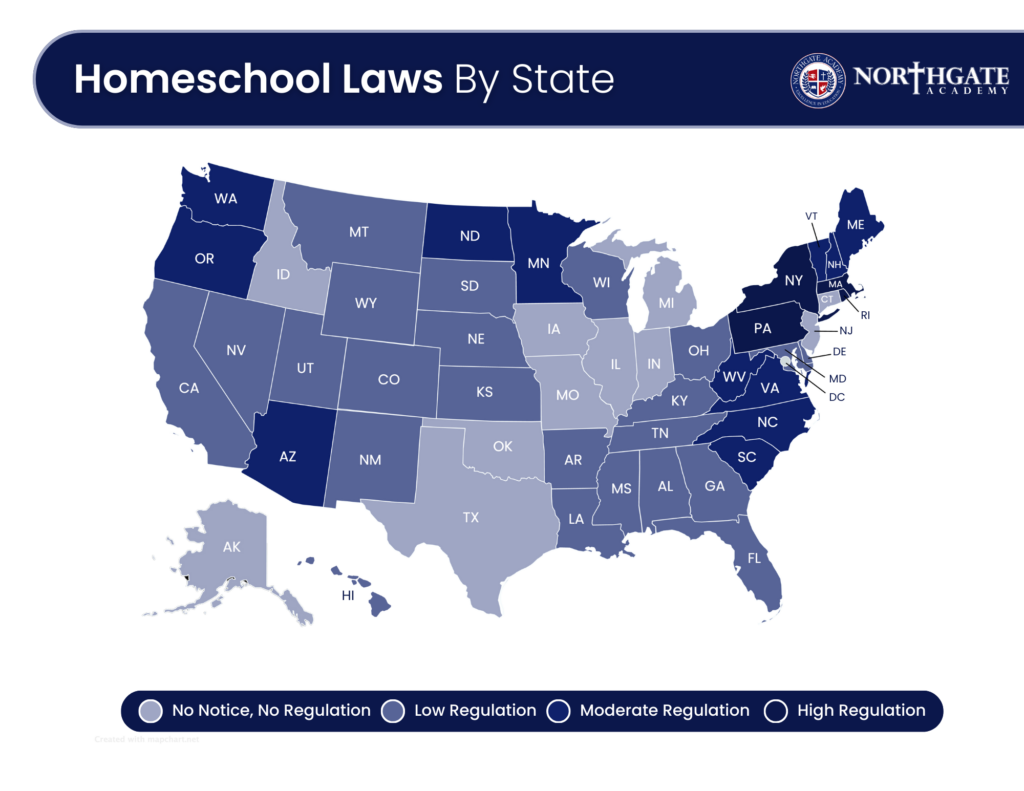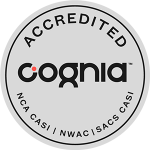Understanding Homeschooling Regulations Across the States
Understanding the homeschooling laws of your state is the first step toward ensuring a legal and effective homeschooling experience. These laws are designed to maintain educational standards and protect the rights of students, while also offering families the flexibility to choose the best educational path for their children. However, the degree of regulation and oversight varies widely across the country, making it essential for homeschooling parents to be well-informed about their specific state’s requirements.
Homeschool laws can be broadly divided into four categories based on the level of regulation, ranging from no regulation, where families are not required to notify the state or maintain educational records, to high regulation, which may include a range of requirements such as submitting detailed educational plans, adhering to state-approved curriculums, and meeting teacher qualification standards.

No Regulation
States in this category offer the most freedom to homeschooling families, with no obligation to inform the state about their homeschooling status or to keep educational records.
Low Regulation
These states require some level of notification, and families may also need to provide test scores or undergo professional evaluations to demonstrate educational progress.
Moderate Regulation
In addition to notification, states with moderate regulation often have specific requirements for curriculum, testing, and professional evaluations, ensuring that homeschooled students receive a comprehensive education.
High Regulation
The most strictly regulated states demand detailed adherence to specific educational standards, including the use of state-approved curriculums and qualifications for homeschooling parents, along with rigorous record-keeping and reporting procedures.
States with High Regulation
High Regulation States: What to Expect
Homeschooling families in highly regulated states may encounter a variety of requirements, designed to closely monitor the educational progress and quality of home-based education. Some common mandates include:
Letter of Intent
Parents may need to submit a formal notification or letter of intent to the local school district or state education department, indicating their decision to homeschool.
Educational Plan Submission
Some states require a detailed educational plan, outlining the curriculum, subjects to be taught, and educational objectives for the homeschool year.
Record Keeping
Meticulous records including attendance, lesson plans, grades, and assessment results must be maintained. These records may be subject to review by state or local education authorities.
Curriculum Requirements
States may specify certain subjects that must be included in the homeschool curriculum, ensuring a comprehensive education that aligns with statewide educational standards.
Teacher Requirements
In some cases, states require the homeschooling parent to meet certain educational qualifications, such as possessing a high school diploma or higher education degree.
Annual Reporting
Families might be required to submit annual reports or portfolios showcasing the student's work, progress reports, and assessment results to the state or local education department for review.
Navigating High Regulation States
Families homeschooling in highly regulated states must be diligent in staying informed about current laws and requirements, as these can change. Utilizing resources such as state education department websites, homeschooling associations, and legal defense organizations can provide valuable guidance and support. Additionally, connecting with local homeschooling communities offers the opportunity to share experiences, advice, and strategies for compliance.
While navigating the homeschooling regulations in these states can seem daunting, the structured framework is designed to ensure that all children receive a quality education, regardless of the setting. By understanding and meeting these requirements, homeschooling parents can provide their children with a fulfilling and compliant educational experience.
States with Moderate Regulation
In states with moderate regulation, homeschooling requires parents to notify local or state education authorities about their homeschooling plans. This step ensures students are officially recognized for their educational path. Following notification, families might face requirements for periodic assessments or evaluations to track academic progress. Though these evaluations aim to uphold educational standards, they are designed to be less demanding than in more strictly regulated states, allowing for a measure of educational flexibility.
Curriculum requirements in these states ensure a comprehensive education but often allow for customization to meet the student’s interests and needs. While there might be guidelines regarding the educator’s qualifications, these are generally not as stringent, promoting a balance between quality education and the unique benefits of homeschooling. Record-keeping supports this balanced approach by documenting educational achievements and progress without overwhelming families.

States with Low Regulation

In states with low regulation for homeschooling, the oversight and requirements from educational authorities are minimal, offering families significant autonomy over their educational journey. These states may only require a simple notification to local education authorities to homeschool, without the need for detailed curriculum plans or regular standardized testing. The focus is on allowing parents to direct their children’s education as they see fit, with the state stepping back to provide families the space to explore educational paths that best suit their children’s needs and learning styles.
Check out this blog post
How to Start Homeschooling: A Beginner’s Guide
This blog post offers vital insights for transitioning to homeschooling, covering state laws, curriculum choices, and resources to ensure a professional educational experience amidst COVID-19 challenges.
Click HereKey Considerations for Homeschool Parents
As a homeschool parent, you are at the heart of your child’s educational journey, which goes beyond just delivering education. It involves comprehensive management, from understanding legal requirements to tailoring educational content and tracking progress. Each aspect plays a crucial role in creating a successful and enriching homeschooling experience that complies with state laws and fosters a nurturing environment tailored to your child’s unique needs.
Record Keeping & Curriculum
Regardless of your state’s requirements, keeping accurate records is crucial. This includes:
Attendance Records
Track daily educational activities, ensuring compliance with instructional time requirements.
Lesson Plans
Outlines of teaching objectives, materials, and assessments, guiding the educational process.
Grade Records
Assessments of academic performance, crucial for monitoring progress and achievements.
Testing & Evaluations
Understand whether your state requires standardized testing, portfolio reviews, or other evaluations. Compliance is vital to avoid legal issues.
Staying Informed
Staying informed about changes in laws and regulations is essential for homeschooling families, as these can evolve. Regularly visiting the US Department of Education website ensures you have the latest information on educational policies. Additionally, joining local homeschooling groups allows you to share insights and experiences with others navigating similar paths, providing a supportive community and valuable updates.
Conclusion
Navigating the complexities of homeschool regulations can be a daunting task for families. Each state’s varying requirements on attendance, curriculum, and assessments mean that parents often find themselves juggling administrative tasks alongside their primary role as educators. This is where Northgate Academy steps in, offering a comprehensive solution that simplifies the homeschooling process. With our expertise, we handle the intricate aspects of compliance, from understanding state-specific regulations to ensuring that all educational requirements are met. This frees parents to concentrate on what’s truly important: providing their children with a quality education tailored to their unique needs and worldview.
At Northgate Academy, we understand that education is not one-size-fits-all. Our flexible online courses are designed to meet state requirements while aligning with your family’s values and educational goals. We’re here to support you every step of the way, from selecting the right courses to navigating the legal landscape of homeschooling. With Northgate Academy, you gain a partner committed to easing the administrative burden of homeschooling, allowing you to focus on inspiring and educating your children in a way that best suits them. Embrace the journey of homeschooling with confidence, knowing that Northgate Academy has the hard stuff covered.




